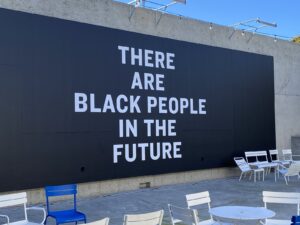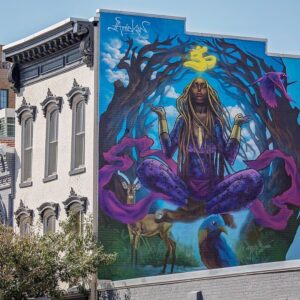the seminar
What might it mean to engage, in earnest, the possibilities of place for a future of Black existence? The “Creative Placemaking, Black Restorative Ecologies, and Black Spatial Futures” Mellon Sawyer Seminar will engage questions of Black futurity that are grounded in place and informed by historical inquiry. The seminar will consider comparative geographies and historical periods to engage questions such as: how have Black subjects made space for their futures in light of persistent assaults on their lives and livelihoods? What restorative ecological practices might we excavate from the past or elevate from the present that will better support Black life and living in times and places yet to come?

In a society structured by racial capitalism, Black people have been rendered disposable and deemed unfit for or undeserving of citizenship, recognized humanity, or even, at times, common decency. This manifests in space and place through residential segregation, housing precarity, community resource extraction, toxic air and water, neglected infrastructure, and otherwise exclusionary geographies. Racial capitalism not only asserts itself materially in space and place, but also discursively in the construction of narratives and socially in individual and institutional interactions. A grounding in the practical and creative means of Black subsistence, endurance, resistance, and thriving in the face of these realities is integral to imagining and creating a more just society. And without attention to place, proposed justice efforts run the risk of being abstract, ungrounded, and unrealizable. What and where, we ask, are the places of Black futurity?

In tandem with calls-to-action to address how we might account for and invest in Black futures amid pervasive violence and the perpetuation of systems that produce, and often rely on, Black expendability, there is an urgency to address where Black futures can take place. Further, if we decenter colonial and capitalist logics of place and attend to the transient, the fleeting, the passing-through or passing-by, the waystations, the pit stops, the pop-ups, and the no-places, we illuminate sites of practice and inhabitation that nurture, steward, or seed Black creative presents and futures: from the quilombos and swamps of maroon communities to the kitchenettes of Black travelers of the Great Migration to the streets of Mardi Gras krewes. Black people have found ways to make do and make place that ensured not only their survival and existence, but also restored them and seeded the possibility for otherwise futures. Here we may ask: How have and how might places restore people? What placemaking potential is built into Black ecological practice? How can ecological pasts offer restorative Black spatial futures?
Taking seriously the politics, particularities, and potentialities of place, this seminar will explore the creative placemaking of historical and contemporary Black subjects and communities; the stewardship of land, resources, and relationships in restorative Black ecological practices past and present; and, the openings for Black spatial futures informed by and grounded in these considerations of space and place.
For some of the scholarship grounding our approach, check out our reading list.